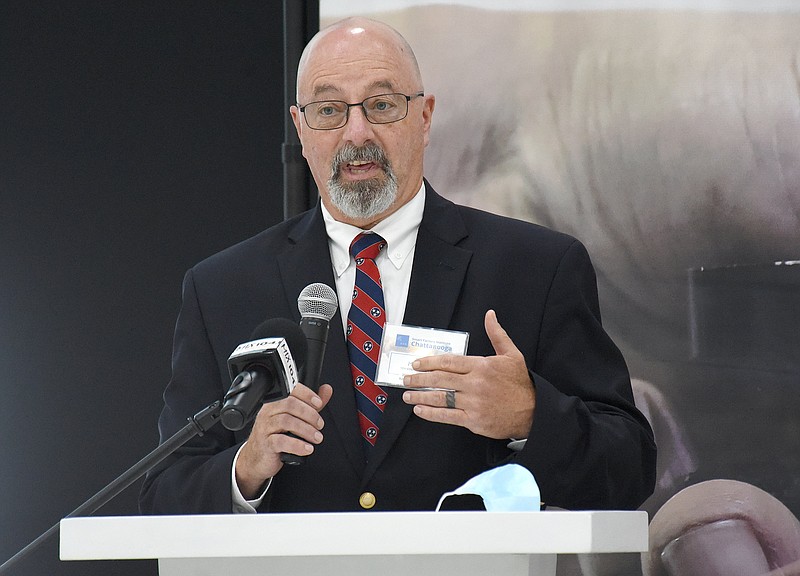NASHVILLE - The Tennessee Senate on Monday delayed final action on a House-passed bill sponsored by Speaker Cameron Sexton, R-Crossville, that allows students and staffers to sue public universities and colleges if they think they're being punished for refusing to accept "divisive concepts" that "inflame divisions" over race, sex, ethnicity and religion.
Senate Judiciary Committee chair Mike Bell, R-Riceville, who announced the delay on Senate floor, later said the holdup was a provision in the House bill requiring the University of Tennessee and other institutions to investigate when a complaint is made.
It says institutions are to investigate any complaint or complaint of a violation within 10 days from the institution's receipt of the complaint and take action.
"That's the part," Bell told the Times Free Press in an interview outside the Senate chamber. "We've not had that in any of our versions that we've looked at in the Senate. And I'm also somewhat concerned that it's such a major change that we might have to send it back to committee if I take it.
"So I'm still wrestling with whether I'm going to take that amendment or not," Bell added. "But we're going to hear, we're going to to get to [the bill]. We're going to get to it."
The bill was introduced by Sexton and Bell after a trio of conservative groups earlier this year issued a report titled "Critical Social Justice in Tennessee Higher Education: An Overview."
The groups' report called on the legislature's GOP supermajority to take action just as it did last year to ban the teaching in public K-12 schools of certain concepts about race.
Unlike last year's K-12 bill, the higher education bill doesn't ban discussion of topics.
It does prohibit a public institution of higher education from conducting any mandatory training of students or employees if the training includes one or more "divisive concepts." And it prohibits discrimination if the students or employees assent to one or more divisive concept. It also prohibits the institutions from requiring students or employees to "reveal or endorse a specific ideology or political viewpoint" to be eligible for hiring, tenure, promotion or graduation.
The bill requires each institution to report the aggregate number of complaints, the investigative findings and the actions taken for a violation of the law for the previous calendar year to the education committees of the Senate and the House by Jan. 1 each year. It also requires each institution to conduct a biennial survey though July 1, 2028, of the institution's students and employees that assesses the campus climate with regard to diversity and campus freedom of speech. It requires the institution to publish the survey results on the institution's website.
Presenting the bill for Sexton in subcommittee was House Assistant Majority Leader Ron Gant, R-Rossville, who called it "an initiative that is near" to the speaker.
"This legislation ... is an effort to ensure that our public universities' credible diversity efforts aren't undermined by initiatives that seek to drive Tennesseans further apart," Gant said. "In Tennessee, we believe that prosperity is greatly aided by progress towards unity, and we reject the promotion of concepts that attempt to cast a shadow on groups of people due to factors not in their control."
Definitions in the bill for what constitutes a "divisive concept" include stating that one race or sex is "inherently superior or inferior to another" and that an individual by virtue of race or sex is "inherently privileged, racist, sexist or oppressive whether consciously or subconsciously."
Other concepts identified as divisive under the bill include a belief that an individual "should be discriminated against or receive adverse treatment" because of the individual's race or sex as well as that someone's "moral character is determined by the individual's race or sex."
Also singled out as divisive is that a person "by virtue of the individual's race or sex, bears responsibility for actions committed in the past by other members of the same race or sex" and that someone "should feel discomfort, guilt, anguish or another form of psychological distress solely because of the individual's race or sex."
Another provision identified as divisive is that a "meritocracy is inherently racist or sexist, or designed by a particular race or sex to oppress another race or sex."
Rep. Yusuf Hakeem, D-Chattanooga,opposed this year's bill on race and issue others as well as last year's K-12 measure impacting K-12.
Contact Andy Sher at asher@timesfreepress.com or 615-255-0550. Follow him on Twitter @AndySher1.
